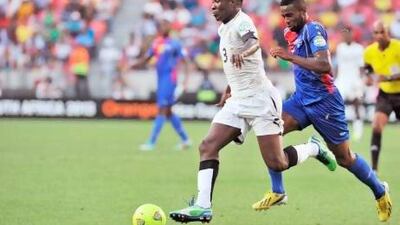At home in Al Ain, Asamoah Gyan seldom feels lonely. As he told reporters here at the African Cup of Nations, when he moved to the UAE 18 months ago, it was with an entourage: "I can't be alone," he said, "so I brought my childhood friends over." His family visit often from Ghana, he added.
On the pitch, he has hardly been short of alibis at Al Ain. Accomplished and resourceful though Gyan is in the penalty box, goals do not flow at the rate of one per hour – which has been Gyan eye-catching average in the UAE Pro League this season – without generous colleagues and abundant assists.
With Ghana, though, he says, there are periods when the captain feels more the soloist, a forager up front short of a helpful sidekick.
One experienced coach in West Africa, who works as a scout and talent spotter for some major clubs in Europe, once explained his theory about how Ghana and Ivory Coast differ in the skills prioritised by schoolboy footballers.
In Ghana, he had observed, children would typically eke out makeshift pitches on patches of rough urban space of 20 or 30 square metres, with goalposts marked by stones set perhaps 60 centimetres apart at either end.
In neighbouring Ivory Coast, he noticed, there were many more examples of makeshift goalposts and crossbars painted onto walls where boys played.
His point was that these nuances shaped the strengths of a generation: Ghana's higher profile players of recent years have been central midfielders – Stephen Appiah, formerly of Juventus, Real Madrid's Michael Essien, AC Milan's Ali Sulley Muntari – while more of their most sought-after Ivorian contemporaries have been strikers, brought up with an instinct for hitting the target rather than seeking control, via skill and strength, of restricted spaces.
It was an interesting, and certainly a well-researched idea, and one that fits the way Ghana's Black Stars have evolved tactically in the period in which Gyan has emerged as the standout leader of their forward line.
He has played alongside several striking partners in the past seven or eight years, but seldom enjoyed a long, successful partnership with another brilliant through-the-middle type of striker. Ghana do not have such a man.
"I have been playing as what people talk about as the lone striker role for a few years now," said ahead of tomorrow's semi-final against Burkina Faso, "and there are times when it can be frustrating.
"But if you end up on the winning side, obviously you are happy, and that is what has happened here."
With his cleverness and dexterity at protecting the ball, Gyan has mastered the lone striker role.
For Ghana at their best, his effectiveness as a target man and his intelligent running creates opportunities and space for the likes of Kwadwo Asamoah, Emmanuel Agyemang Badu and Mubarak Wakaso to advance into positions of menace from midfield.
But a Ghana obliged to commit their resources deeper, as they were for much of the later phases of a hard-fought quarter-final win over Cape Verde on Saturday, can leave their captain looking isolated.
Gyan, up against a formidable Burkinabe defence on Wednesday, has a single goal to his name in his four matches here at the tournament so far.
He could have notched at least two more had he taken the pair of penalties awarded to Ghana – the latest after Gyan was impeded against Cape Verde – rather than hand over that duty, which used to be his in the national team, to Wakaso.
"When there is no other option, like in a penalty shoot-out, I will take a penalty for Ghana," he said. "But I came to the decision not to be Ghana's penalty taker with my mum just before she died."
Gyan's mother, who passed away last year, had seen the stress his missed penalty near the end of extra time in the 2010 World Cup quarter-final against Uruguay caused Gyan.
Besides, he has plenty of other duties to cope with, what with the captain's armband and the sometimes lonely patrol of the Black Stars' forward line.
Follow us


